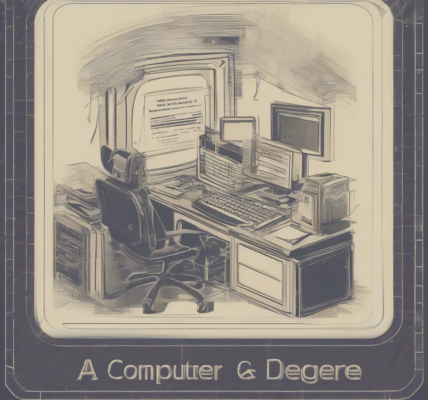Unlock Your Tech Potential: A Comprehensive Guide to Online Computer Science Bachelor’s Degrees
Unlock Your Tech Potential: A Comprehensive Guide to Online Computer Science Bachelor’s Degrees
The digital age has revolutionized education, making higher learning more accessible than ever before. For aspiring computer scientists, the online bachelor’s degree offers a flexible and convenient pathway to a rewarding career. This comprehensive guide explores the world of online computer science bachelor’s degrees, covering curriculum, accreditation, career prospects, and crucial considerations for prospective students.
Curriculum and Coursework
Online computer science bachelor’s degree programs mirror their on-campus counterparts in terms of core competencies, albeit with adjustments for the online learning environment. Expect a rigorous curriculum encompassing:
- Fundamentals of Programming: Proficiency in at least one programming language (e.g., Python, Java, C++) is paramount. Expect courses covering data structures, algorithms, and software development methodologies.
- Data Structures and Algorithms: A cornerstone of computer science, this area explores efficient ways to organize and manipulate data. Expect theoretical analysis and practical implementation exercises.
- Databases: Understanding database management systems (DBMS) like SQL and NoSQL is crucial for handling large datasets. Courses will cover database design, querying, and optimization techniques.
- Discrete Mathematics: This foundational subject provides the mathematical underpinnings for computer science concepts, including logic, set theory, and graph theory.
- Operating Systems: Students gain an understanding of how operating systems function, manage resources, and interact with hardware. Concepts like process management, memory management, and file systems are covered.
- Computer Networks: This area explores network architectures, protocols, and security. Topics include TCP/IP, network security, and cloud computing concepts.
- Software Engineering: Students learn the principles of software development, including software design, testing, and maintenance. Emphasis is often placed on Agile methodologies and collaborative development.
- Web Development: Many programs offer specialized tracks in web development, covering front-end technologies (HTML, CSS, JavaScript) and back-end technologies (e.g., Node.js, Python/Django).
- Artificial Intelligence (AI) and Machine Learning (ML): Increasingly popular, these specialized areas delve into the creation of intelligent systems capable of learning and problem-solving.
- Cybersecurity: With growing concerns about data breaches and cyberattacks, many programs include cybersecurity courses covering network security, cryptography, and ethical hacking.
Accreditation and Program Quality
Choosing an accredited online computer science bachelor’s degree program is crucial. Accreditation ensures that the program meets established quality standards, enhancing the credibility of your degree and improving your job prospects. Look for programs accredited by reputable organizations such as:
- ABET (Accreditation Board for Engineering and Technology): ABET accreditation is highly regarded and signifies a rigorous program meeting industry standards.
- Regional Accreditation Agencies: These agencies accredit institutions as a whole, ensuring overall quality and academic integrity.
Beyond accreditation, consider factors like:
- Faculty Expertise: Investigate the qualifications and experience of the faculty teaching the courses. Look for professors with industry experience and a strong research background.
- Student Support Services: A strong online program will offer robust student support, including academic advising, tutoring, and career services.
- Course Delivery Methods: Consider the methods used for delivering the coursework. Some programs rely heavily on asynchronous learning, while others incorporate synchronous elements like live lectures and virtual labs.
- Technology and Resources: Ensure the program utilizes reliable learning management systems (LMS) and provides access to necessary software and resources.
- Program Reviews and Student Testimonials: Reading reviews and testimonials from current and former students can provide valuable insights into the program’s strengths and weaknesses.
Career Prospects and Salary Expectations
A computer science bachelor’s degree opens doors to a wide range of lucrative and fulfilling careers. Graduates can pursue roles such as:
- Software Engineer: Design, develop, and maintain software applications.
- Web Developer: Build and maintain websites and web applications.
- Data Scientist: Analyze large datasets to extract insights and make predictions.
- Database Administrator: Manage and maintain databases, ensuring data integrity and availability.
- Network Engineer: Design, implement, and maintain computer networks.
- Cybersecurity Analyst: Protect computer systems and networks from cyber threats.
- Machine Learning Engineer: Develop and implement machine learning algorithms.
- Artificial Intelligence Engineer: Design and build intelligent systems.
- Game Developer: Create and develop video games.
- Information Systems Manager: Oversee the information technology systems of an organization.
Salary expectations vary depending on factors like experience, location, and specialization. However, computer science graduates generally command competitive salaries, with many earning six-figure incomes early in their careers.
Choosing the Right Online Program
Selecting the ideal online computer science bachelor’s degree program requires careful consideration of several factors:
- Program Structure and Curriculum: Assess the program’s curriculum to ensure it aligns with your career goals and interests.
- Learning Style and Preferences: Consider your learning style and preferences when choosing a program. Some programs are more self-paced, while others have stricter deadlines and schedules.
- Cost and Financial Aid: Compare tuition fees and explore financial aid options, including scholarships and grants.
- Career Services and Support: Look for programs that offer robust career services, including resume building, job search assistance, and networking opportunities.
- Technology Requirements: Ensure you have the necessary technology and internet access to complete the program successfully.
- Time Commitment: Be realistic about the time commitment required to complete an online program. Factor in coursework, assignments, projects, and exams.
- Flexibility and Convenience: Choose a program that offers the flexibility and convenience you need to balance your studies with other commitments.
- Reputation and Accreditation: Verify the program’s accreditation and reputation within the industry.
- Faculty and Student Interaction: Assess the opportunities for interaction with faculty and fellow students.
- Graduation Rate: A high graduation rate indicates a successful program that supports students to completion.
Addressing Common Concerns
Potential students often have concerns about online learning. Let’s address some of these:
- Lack of Face-to-Face Interaction: While online programs lack the traditional face-to-face interaction of on-campus programs, many offer virtual discussion forums, online study groups, and virtual office hours to foster interaction.
- Difficulty Staying Motivated: Self-discipline and time management skills are crucial for success in online learning. Developing a structured study schedule and seeking support from peers and instructors can help maintain motivation.
- Technical Issues: Reliable internet access and technical proficiency are essential. Choose a program with a robust technical support system to assist with any challenges.
- Credibility of Online Degrees: Accredited online programs are just as credible as their on-campus counterparts. Employers increasingly recognize the value of online learning.
- Limited Access to Resources: While some resources may be accessed differently in an online environment, reputable programs provide access to libraries, labs, and other essential resources.
Conclusion (Omitted as per instructions)




